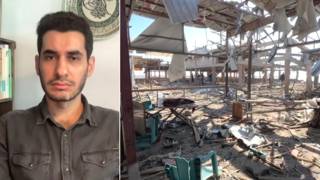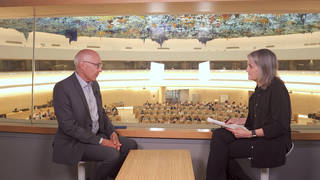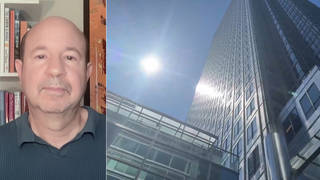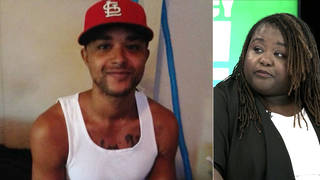
Guests
- Roberto Rodríguezprofessor at the University of Arizona and director of the Raza Database Project, a network of researchers, scholars, journalists, activists and family members of victims killed by law enforcement.
- Marissa Barrerafounder of Voices of Strength, an organization founded in August 2020 for the impacted families of police killings.
A major new report on police killings suggests far more people of color have died in police custody than previously known. The report by the Raza Database Project and UnidosUS found that deaths of Latinos, Asian and Indigenous peoples have been historically undercounted. Researchers documented the deaths of 32,542 people who have been killed by police since 2000, 60% of whom constitute people of color, who make up just 40% of the U.S. population. “We found many more killings than expected,” says Roberto Rodríguez, professor at the University of Arizona and director of the Raza Database Project, a network of researchers, scholars, journalists, activists and family members of victims killed by law enforcement. “There is no systematic effort to count, to collect this data. The FBI is supposed to, but they don’t. It’s up to the media and independent researchers, and it’s really difficult,” Rodríguez says. We also speak with Marissa Barrera, who became an advocate against police violence after police in Woodland, California, killed her brother, Michael Barrera, in 2017. “All the other families that I work with, they have similar stories just as bad,” Barrera says. “We go through the same things.”
Transcript
AMY GOODMAN: This is Democracy Now!, democracynow.org, The Quarantine Report. I’m Amy Goodman, with Juan González.
A major new report on police killings suggests far more people of color have been killed by police than previously known. The report by the Raza Database Project and UnidosUS found at least 2,600 Latinos were killed by the police since 2014, a figure 24% higher than previous counts. Overall, researchers documented the deaths of over 32,000 people who have been killed by police since 2000. People of color accounted for 60% of the deaths despite making up roughly just 40% of the population.
We’re joined right now by Roberto Rodríguez, the director of the Raza Database Project, a network of some 50 researchers, scholars, journalists, activists and family members of victims killed by law enforcement. He’s also a professor at the University of Arizona and the author of several books, including Yolqui, on police violence in Black, Brown and Indigenous communities, and Justice: A Question of Race, where Roberto Rodríguez details his own experience after a brutal beating at the hands of L.A. sheriffs in March of 1979.
Professor, thanks so much for joining us. First, lay out what you found.
ROBERTO RODRÍGUEZ: Well, you know, I’ve been researching this since '79, and I, myself, was surprised. We found many more killings than expected. We didn't even include the Border Patrol killings, which is about 128 in the last 10 years. We’ll include that in the final report. But what we found is that there is no systematic effort to count, to collect this data. The FBI is supposed to, but they don’t. It’s up to the media and independent researchers. And it’s very difficult.
But regardless, again, we combined about five different databases and found those 32,000-plus. You know, I’m going from memory: I think the Black community suffers from about over 6,600 killings since 2000; the Latino, or the Brown population, is about 5,700; the Asian community, about 3,000; and the Native community, over 500. Proportionately, the Native community actually is the highest. But something that’s very important to note, it’s not really the percentages that’s the most important here; it’s the number, because, in other words, what if we were killed at the 40% rate instead of 60? Believe me, it would not be acceptable, because we’re still talking those same numbers, and it’s through the roof.
And I think one of the other important things, aside from what we found, is that there were 6,000 cases of unidentified, unknown. And much of it, often, is when the police say “no information available.” And they do not release it like the same day, the next day, the next week, sometimes a few weeks later, sometimes a few months later, other times never. That complicates our research. And that’s why we’re going to — between now and the release of the final report, which will be at the end of the summer, we’re going to track down those 6,000 cases as best as we can.
The thing to remember, it’s not going to be the most accurate thing in the world, but it’s going to be more accurate than what exists now. That’s why I emphasize this shouldn’t be up to us. This should be the government that requires every law enforcement agency to report. They don’t. You know, they never have. And I think that’s the most poignant aspect of this. Yeah, it’s like everything is normalized. It’s taken for granted. In Europe — more Latinos are killed in this country than in all of Europe combined. More African Americans are killed than all of Europe combined. You know, that’s unacceptable, completely.
JUAN GONZÁLEZ: And, Roberto, I wanted to ask you — looking at these figures, which are really astounding, it seems that, on average, every day in America, at least one Latino and one African American is killed, either in the custody of police or through shootings. Can you talk about your decision to include those deaths in custody, as well?
ROBERTO RODRÍGUEZ: Yeah. Well, I mean, I think it answers itself. They’re under — it’s like Sandra Bland, for example, you know? She was under custody of officers. So, if somebody is in a jail or in the police car — you know, we have cases where somebody shoots themselves when they’re handcuffed in the back of the car, and they shoot themselves in the front. I mean, in other word — and they claim that’s a suicide. No. So, we have to claim any death where the responsibility lies with the officers.
You know, there’s even cases we did not include, and we’re going to. We have to. All the people that die along the border, they’re not there — they don’t die accidentally. We have the documentation where the government says they drove people — or, they drive people into the desert so they can die. And that way, it will discourage people from coming through. How do you not include that? You know, how do you not include a Border Patrol that makes it policy to chase people? Cars overturn. You know, 10 people die, etc. It’s even bigger than what we’re talking about, you know.
And then, again, it’s all about dehumanization. And I’m not exaggerating when I say I track this violence to 1492, which means when Europeans came here, they decided that the people here, like myself, that we were not human. Africans that were brought here also were not human, according to them. In my opinion, it’s the same dynamic taking place today; otherwise, we wouldn’t see this massive amount of both the killings and the disparity.
JUAN GONZÁLEZ: And in terms of the tremendous explosion in numbers, especially among Asian Americans and Native Americans, that you found when you began to go into that “other” category, could you talk about that, as well?
ROBERTO RODRÍGUEZ: Yes. Yes, well, you know, it was accidental. So, there’s three categories that we weren’t looking at in the past. We were just looking at — like, Washington Post is the standard. The Guardian used to be, but they stopped, you know? But The Guardian has — or, rather, the Post has five categories: white, Black, Hispanic, other and unknown. So, I was used to going into the Hispanic category, because that’s what they call it. So, I would look in there. One day, by accident, I think I stumbled onto the “unknown” category, and I saw Garcias, Lopez, Sanchez. And I’m like — I go, “Wait a minute. How could that — why would they be in the unknown category? They belong in that other category.” And then I said, “Oh, you know, let me look at the white category.” Same thing: Lopez, Sanchez, Gonzalez. And I’m like, “Wait a minute. Something’s wrong here.” And then I checked the “other.” Now, “other” actually has — that’s where they place primarily people from the Middle East, Asian Pacific and Native, you know? They don’t have separate categories. I don’t think you find a lot of Latinos in the “other” category, but definitely in the “unknown” and the “white” category. And it’s just too many.
And it’s convenient — well, I don’t blame the media for this. You know, it’s literally the government. That’s why I say it’s their responsibility. But it’s convenient because it continues the dialogues. The nation can simply see it as like this is a problem between white and Black America, when in reality it is that, but it’s even bigger, much bigger, like you said.
The one that I want to continue researching, the Asian figures. Those are through the roof. Personally, I had zero idea, because I’ve been monitoring, since 2014, you know, the databases, and I had never seen that before. So, I’m not sure, you know, what the deal is. We’re going to pursue that.
You know, one of the things that we asked ourselves as a group: Should we count all deaths, in custody, etc.? And everybody said yes. And personally, I wanted just the ones that are unjustified. But how do you determine what’s unjustified, when you don’t have a judicial system that works? You know, it’s like, I would say, 99.9% impunity both in the killings that we examined and also the Border Patrol. You know, you can count in one hand, with a finger or two to spare, of police officers that are doing hard time, say, 30, 40, 50 years to life. You know, I doubt there’s even five. Personally, I think that’s the actual solution. Until you see that, you’re not going to see anything. No reform is going to fix anything, because all a cop has to say is “I feared for my life.” You know? And that absolves everything.
AMY GOODMAN: I also wanted to bring into this conversation, Roberto Rodríguez, Marissa Barrera. She became an advocate against police violence after police in Woodland, California, killed her brother Michael in 2017. She’s the founder of the nonprofit Voices of Strength, which works with the families of other victims killed by police. She’s joining us from Sacramento, California. Marissa, welcome to Democracy Now! So sorry to hear about your brother, Michael Barrera. Tell us what happened to him in 2017.
MARISSA BARRERA: Hello, and thank you for having me this morning.
In 2017, my brother, he was murdered by police in our hometown. The details are still not all clear, but we do know — and this is through physical evidence and audio, video, pictures now at this point — that he was — before being killed by police, he was assaulted in his home by a known assailant. And just moments later, he was murdered by multiple officers.
And he was killed in a similar way to George Floyd. He had five officers on top of him. And the struggle lasted moments. He had a Taser used on him excessively, according to their own policies. And he was being beaten, and he was ultimately suffocated to death. He had a knee in his back. There is question whether he had two knees from this officer who was sitting on his back who is over 250 pounds. My brother was saying, “I can’t breathe.” He was struggling. He was asking for help.
We don’t know who assaulted him in his house, but we have reason to believe that it had to do with the police, for the fact the way he was murdered. He was unarmed. He was not posing a threat to these officers. And he was telling them he was not a threat and asking them why they were trying to kill him, as they already had guns and stuff, and they were rounding up on him. So, we do have reason to believe that they were involved in some way, as my brother was speaking on things going on in the community, such as missing people and missing teenagers, just days before he was murdered this way.
We do have the video evidence. We do have the audio. We have the damages done to his body. But just after this happened, they covered it up. They put a false narrative on him to make him look like he was this criminal who was out there trying to harm people and trying to kill the police. That really starts to tell you what happened to my family.
JUAN GONZÁLEZ: And, Marissa — Marissa, I wanted to ask you, specifically, what was — what were you initially told by authorities had happened? What was their initial account to you?
MARISSA BARRERA: So, I do want to say we were not informed by the police of my brother’s murder. We found out by an acquaintance in town who was at the hospital. We arrived. They were refusing to let my family in with my brother. They were refusing to let my mother see my brother in his final moments. He was already deceased, but he was two doors down from us, and they had police blocking us. At that point, they just told us that he was found dead in somebody’s yard. There was some kind of altercation.
I found out, by going to his home and finding police blocking off his home, where he was not killed, that police had killed him. So, just fast-forward that day, we were told by the sergeant of Woodland PD, Sergeant Guthrie, that my brother was in some kind of fight, a struggle with multiple cops, that he was running from cops, it was a foot chase, that he was unarmed, and he was killed. Fifteen minutes later, they released — the Woodland PD released into our local news, the Daily Democrat, that my brother had multiple weapons — he had a golf club, a chef’s knife, scissors — that he was naked, in a trench coat, that he was breaking into cars, and that he was charging and attacking officers. They said so many horrible things about my brother, only 15 minutes after they told my family to our face that he was an unarmed man who was killed by multiple officers, and they didn’t know why.
AMY GOODMAN: We’re talking to Marissa Barrera, founder of the nonprofit Voices of Strength. Marissa, tell us what you are demanding now.
MARISSA BARRERA: So, what we are demanding now — fast-forward four years later, so many facts and truth have came out. All that I shared with the first narrative was not true. My brother was dressed. He was assaulted in his home before cops, and he did not assault them. And I’ve seen the video, I’ve heard the audio.
So, we want full transparency. We want his case reopened. But right now with everything going on in the country and police killings being brought to light, we are asking, with other families, that all of our cases be opened, because there is so much corruption, so much horrible things behind all of our killings. So, that is why I work with the other families, as well, because it’s happening to all of us. How bad my brother’s story is, which I just shared a piece of it — it’s horrible — but all the other families that I work with, they have similar stories, just as bad. We have our own just unique twist to it, but, ultimately, we go through the same things.
JUAN GONZÁLEZ: And I’d like to bring Roberto Rodríguez back into the conversation.
ROBERTO RODRÍGUEZ: Yes.
JUAN GONZÁLEZ: Roberto, this whole issue of reform, there’s been all this talk now in the past year since the death of George Floyd about ways to reform or even defund the police. You have a long history in dealing with police abuse. What is your sense of where these calls for reform or transformation of policing are going to go?
ROBERTO RODRÍGUEZ: Yeah. Well, I’m in full support of all of that. The problem, what I’m saying, is that if an officer simply says they were in fear for their life, none of those reforms are going to help. But that doesn’t mean you stop everything that you can do. It’s kind of like body cameras. That was not happening before. You know, accountability projects, etc., all that stuff, I mean, there are a number of things that have happened, a number of reforms, and they’re all good. Personally, I mentioned a second ago, 30, 40, 50 years to life, that’s the only thing that’s going to stop this. However, one of the things that we’re doing as part of the project is looking at going to the International Criminal Court at the U.N., and the OAS version also. We’ve gone to the U.N. before, the Convention on Racism. We know they’re racist. It’s not enough. It’s got to go to the criminal level, where they hunt down Nazis 70 years after the fact. Marissa just mentioned families. You know, killings have no statute of limitation. That’s why you’re able to hunt down people. And what Marissa said is accurate: Every single family has a story, and they’re powerful, and they have to live and relive, you know? And it’s inhumane. So, I personally think that anybody that comes up with a reform and can pass one, great, you know? But we can’t stop there. We have to continue, you know, with transparency, access to videos, everything.
You know, when the cameras started happening, people said, “Oh, it’s going to be over now.” But, you know, all the killings that we’re talking about, how many prosecutions? I had to watch probably over a thousand videos to do my book, the Yolqui book. And I can tell you, it doesn’t really matter. You can see it, and then they’ll say, “Ah, you didn’t see what happened before.” Or they’ll say, “Oh, you didn’t see what happened afterwards.” You know, there’s a man out of Bakersfield, Francisco Serna, who was killed. They thought he had a weapon, and they found a crucifix on him, Francisco Serna. There was a Daniel Covarrubias, out of the state of Washington, who was killed carrying a cellphone. You know who he was? The great-grandson of Chief Joseph. That cellphone, right? To me, that’s the scariest thing, even scarier than the crucifix. You know why? Because everyone has a cellphone. So, if they want to claim that “I saw a shiny object,” you know, and they’re going to find a cellphone on pretty much everybody.
You know, the problem is not police by themselves; it’s the judicial system, and it’s the politicians that are cowardly, that will not step forward. It’s our society as a whole. You know, I mean, I don’t have to tell you; you cover this every single day. We live in a society based on those that have and those that don’t, you know? So, basically, we — and I look at it like those that are considered human, those of us that are not considered human. And you’re right — I’m sorry. Go ahead.
AMY GOODMAN: Oh, I just wanted to thank you very much for being with us and say that we want to have you back on when you have your final report. Roberto Rodríguez is the director of the Raza Database Project, which just published the preliminary report titled “Deaths of People of Color by Law Enforcement Are Severely Under-Counted.” Roberto Rodríguez is a professor at the University of Arizona, author of several books, including Yolqui: A Warrior Summoned from the Spirit World: Testimonios on Violence, on police violence in Black, Brown and Indigenous communities, also the book Justice: A Question of Race, where Roberto Rodríguez details his own experience after a brutal beating at the hands of L.A. sheriffs in March of 1979. And we want to thank Marissa Barrera, founder of the nonprofit Voices of Strength, who works with families of other victims killed by police. Her own brother, Michael Barrera, was killed by Woodland, California, police in February of 2017.
Coming up, we go to Canada, where the bodies of 215 children have been found on the grounds of a former residential school where Indigenous children were sent after being forcibly separated from their families. Stay with us.













Media Options